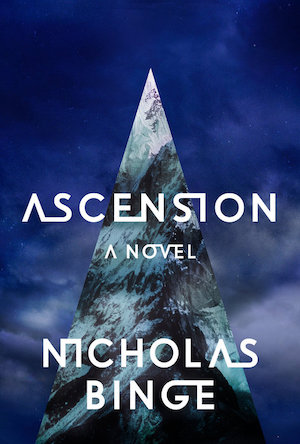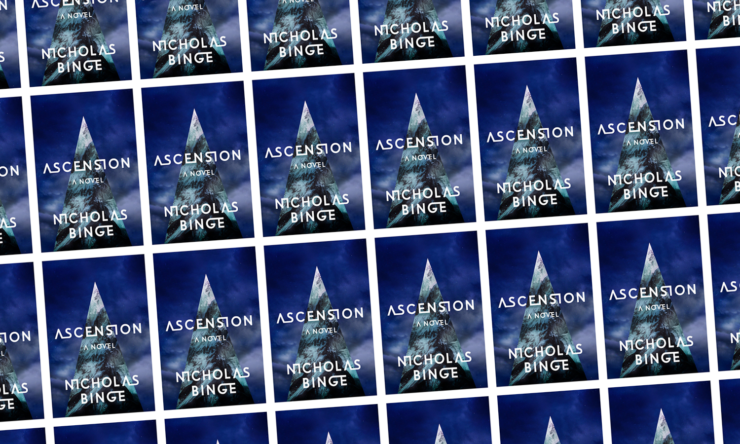In the 17th century, cooling temperatures pushed the Bossons Glacier to a small settlement outside the French village of Chamonix, swallowing whole farms and houses. The terrified villagers of Chamonix, convinced the glacier was infested by demons, hired the Bishop of Annecy to exorcise it. Classical and medieval Europeans, notes Eric Wilson in The Spiritual History of Ice, regarded the Alps—and alpine regions in general—as terrifying places, full of demons, dragons, monsters, witches, and ghosts. But a few outliers—Jean-Jacques Rousseau among them—saw a different set of spirits in the lofty peaks and rarefied air. Early mountaineers believed heights gave them access to the sublime, a strengthened connection to the mystery and magic of the universe.
By the time the Enlightenment was in full swing, alpine mountaineering had come to serve as a stand-in for the process of enlightenment itself: the lone (white, obviously; gentleman, obviously) knowledge-seeker, attaining the summit in solitary triumph, from which he could gaze out upon the clear vistas of superior knowledge. By the early 1800s, Chamonix was a tourist trap. Mary Shelley famously spent the summer of 1816 there; in her 1818 masterpiece Frankenstein, she sends Victor Frankenstein to Montanvert Glacier—just a handful of miles from the glacier exorcised in 1690—where, upon ascent, he encounters the monster of his own creation, frolicking easily about the ice he has just laboriously struggled across.
Nicholas Binge’s new novel of mountain exploration gone very wrong, Ascension, is well placed within this long-standing tension between the pursuit of enlightenment and frightful monsters on ice. In the book’s opening section, we are introduced to our distinctly Lovecraftian protagonist, Harold Tunmore, “an esteemed scientist and Renaissance man,” by his brother Ben. “There was always some far-flung discovery, some hidden spool of thread he had to pull that would take precedence over other people,” Ben writes. In 1990, the elusive, globe-trotting Harold fails to show up for family Christmas, to the great disappointment of Ben’s young daughter Harriet, perhaps the only family member to enjoy a sympathetic relationship with her uncle.
Buy the Book


Ascension
Months later, Harold sends Harriet three bizarre, fantastical letters, and then is never heard from or seen again. Ben does his best to find his brother, visiting mutual acquaintances and laboratories where he knows Harold conducted research; but, he notes, “[i]t was as though, in the winter of 1990, he had simply vanished into thin air.” Eventually, Ben and his sister, Poppy, have their brother declared officially dead and do their best to move on with their lives.
Thirty years after his disappearance, Harold pops up in an appropriately gothic and crumbling psychiatric institution, where he has apparently been residing for some time unbeknownst to his family. Ben rushes to the scene, only to discover that his now-elderly brother is a bit the worse for wear. Harold is prone to psychotic fits and in possession of a mysterious bundle of papers; the night Ben makes off with them, Harold sets himself on fire and dies for real. His papers turn out to be a series of letters to Harriet, apparently written in the early 1990s and never sent. Comprising the novel’s bulk, they detail an impressive and perilous adventure abroad.
As Harold’s letters soon reveal, the 1990s were for him a rather busy time. In 1991, a vast mountain appeared out of nowhere in the middle of the South Pacific. How big? Well, it’s bigger than Everest. Harold, then an internationally esteemed physicist, is summoned to participate in an exploratory team along with several other scientists, a handful of military types, and a megalomaniacal alpinist with a penchant for naming newly-conquered glacial features after himself, who is to serve as the team’s guide. In classic genre form, Harold learns in short order that his companions are not the first to set foot on mystery mountain; his team is actually a second expedition, assembled after the members of the first group—including Harold’s estranged, overly virtuous wife Naoko—either didn’t come back at all or, in the case of Naoko, Came Back Wrong.
Who, exactly, is footing the bill for this foray? Why is everyone acting so weird? Why does Harold see events that have already happened as though they are taking place in the present? What does Naoko know that she isn’t saying? Why did the military types bring along such big guns? And who are those sinister tentacled beings crawling out of fissures in spacetime? These are the questions whose answers await us within Ascension’s briskly-paced pages.
As any reader of H.P. Lovecraft’s 1931 Antarctic-trip-gone-gone-wrong novella At the Mountains of Madness can tell you, in the event one encounters tentacular beings atop a sinister mountain, it is best to head home immediately. While Nicholas Binge has certainly read his Lovecraft (as have I), Harold Tunmore clearly has not—though one might also point out that such an exeunt is common sense, regardless of one’s reading material. Of course, if people in horror novels behaved sensibly, horror novels would be both very short and very dull. Happily, what soon becomes a series of truly unpleasant predicaments for our hero makes for a series of fast-moving thrills for the reader, as Harold recounts the increasing paranoia of the expedition members, the increasingly ominous activities of their tentacled pursuers, and the rapidly increasing body count.
The novel is not without its flaws. The robust action overtakes much of the characterization, and the novel’s female characters in particular feel thinly drawn. Naoko is so saintly as to approach caricature, and the supposedly world-renowned biologist Polya Volikova, whose presence, Harold reports, leaves him “starstruck,” barely registers. Most interesting is Colonel Grace Palmer, one-half of the duo nominally in charge of the expedition, whose backstory and behaviors are given a little more room to develop. Overall, however, Ascension is robust and fast-moving fun, with the occasional detour into contemplative moments as Harold ponders the meaning and function of spacetime and comes to understand more of the mysterious mountain’s ominous—and spectacular—properties.
These days, mountain tourism is the province of the wealthy; nearly anyone with enough money and in moderately good physical shape can pay a team of guides to drag them to a summit for a triumphant selfie. The bar is ever higher for truly spectacular achievement in the field, but the truly gifted—and well-funded—athletes who conquer increasingly formidable tasks are often rewarded with corporate sponsorships, book deals, and hagiographic documentaries of their accomplishments. In this sense, Binge’s mysterious peak is as otherworldly as its tentacular residents; Harold and his team are driven by the thirst for knowledge as much as they are for glory, even if the end result is disastrous regardless of their motives. (“It is as if there is a hunger that has lodged itself inside of me that can only be sated by climbing higher,” writes Harold as he climbs.)
But their folly—and their arrogance—is timeless, and by the end of the novel, I found my sympathies aligning more and more with the interdimensional tentacle beings. As Ripley notes of the titular monsters in Aliens, “You don’t see them fucking each other over for a goddamn percentage.”
Harold himself comes to a similarly pessimistic view of humanity by the novel’s final pages, but the book ends nevertheless on a hopeful note. “If you are a believer in these letters,” writes Ben, “as I have come to be, perhaps there is a reason to be optimistic.” There’s still a lot of mystery left in the world, after all, and we do not need to summit mountains to ponder their many meanings.
Ascension is published by Riverhead Books.
Sarah McCarry’s most recent novel is The Darling Killers. She writes occasional letters about sailing, ice, and books; you can sign up for them here.










